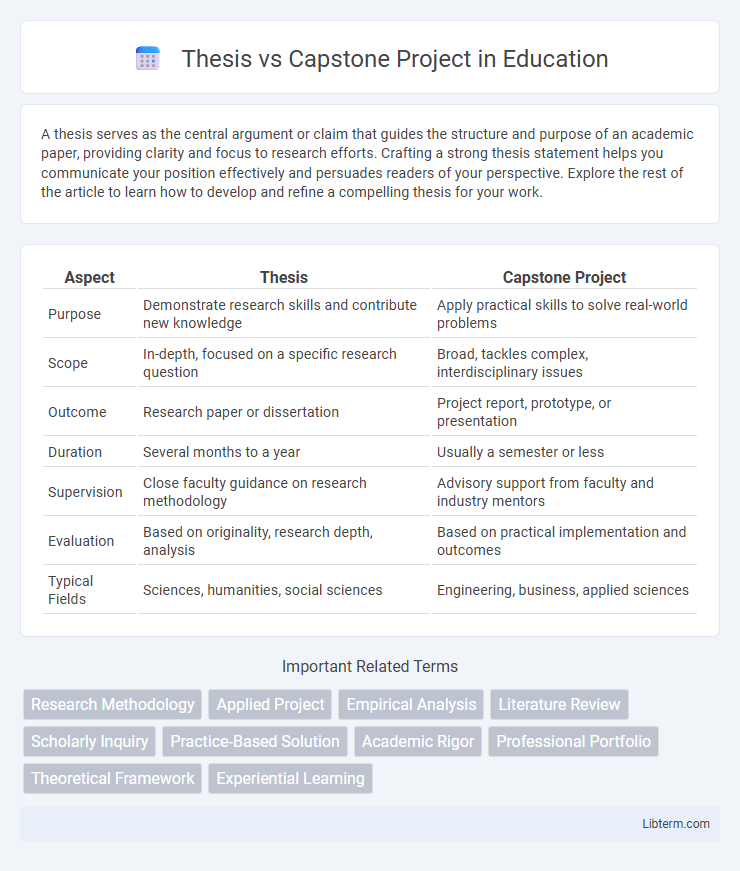A thesis serves as the central argument or claim that guides the structure and purpose of an academic paper, providing clarity and focus to research efforts. Crafting a strong thesis statement helps you communicate your position effectively and persuades readers of your perspective. Explore the rest of the article to learn how to develop and refine a compelling thesis for your work.
Table of Comparison
| Aspect | Thesis | Capstone Project |
|---|---|---|
| Purpose | Demonstrate research skills and contribute new knowledge | Apply practical skills to solve real-world problems |
| Scope | In-depth, focused on a specific research question | Broad, tackles complex, interdisciplinary issues |
| Outcome | Research paper or dissertation | Project report, prototype, or presentation |
| Duration | Several months to a year | Usually a semester or less |
| Supervision | Close faculty guidance on research methodology | Advisory support from faculty and industry mentors |
| Evaluation | Based on originality, research depth, analysis | Based on practical implementation and outcomes |
| Typical Fields | Sciences, humanities, social sciences | Engineering, business, applied sciences |
Understanding Thesis and Capstone Project
A thesis is a comprehensive research project that involves formulating a hypothesis, conducting extensive academic research, and presenting findings to contribute original knowledge to a specific field. A capstone project emphasizes practical application by solving real-world problems through hands-on experience, often culminating in a final presentation or portfolio. Both require critical thinking and analysis, but a thesis prioritizes theoretical research, while a capstone project focuses on practical implementation.
Key Differences Between Thesis and Capstone
A thesis involves extensive original research and aims to contribute new knowledge to a specific academic field, typically requiring a formal defense. A capstone project focuses on applying existing knowledge to solve practical problems, often culminating in a comprehensive project or presentation. Thesis projects emphasize theoretical analysis and methodology, whereas capstone projects prioritize real-world application and interdisciplinary collaboration.
Purpose and Objectives
A thesis primarily aims to contribute original research to a specific academic field by formulating a hypothesis and conducting a systematic investigation. In contrast, a capstone project focuses on applying theoretical knowledge and practical skills to solve real-world problems or create tangible outcomes. The objective of a thesis is to demonstrate scholarly research abilities, while a capstone project aims to showcase practical expertise and integrative learning.
Structure and Components
Thesis projects typically involve a formal structure consisting of an introduction, literature review, methodology, results, discussion, and conclusion, emphasizing original research and hypothesis testing. Capstone projects often feature a practical framework including problem statement, project plan, implementation, analysis, and final presentation, focusing on applying learned skills to real-world scenarios. Both require a clear objective, systematic data collection, and critical evaluation but differ in depth of research versus applied outcomes.
Research vs Practical Application
A thesis emphasizes original research, requiring students to formulate hypotheses, gather data, and analyze results to contribute new knowledge to their academic field. In contrast, a capstone project centers on practical application, where students solve real-world problems or create tangible outcomes using skills acquired throughout their coursework. While both involve critical thinking and synthesis, theses prioritize theoretical frameworks, whereas capstone projects highlight experiential learning and implementation.
Academic Requirements
A thesis requires extensive research and original contribution to a specific academic field, often culminating in a formal written document evaluated by a committee. Capstone projects emphasize practical application of accumulated knowledge through real-world problem-solving, typically incorporating presentations or prototypes. Academic requirements for theses usually demand a higher level of theoretical analysis and methodological rigor compared to the more integrative, experiential learning approach seen in capstone projects.
Evaluation and Assessment
Thesis evaluation typically involves a comprehensive defense before a committee, emphasizing original research, critical analysis, and contribution to academic knowledge. Capstone project assessment focuses on practical application, problem-solving skills, and the ability to integrate and synthesize coursework to address real-world challenges. Both require formal presentations, but the thesis demands rigorous methodological scrutiny while capstones prioritize demonstrable project outcomes and professional competencies.
Time Commitment and Process
Thesis projects typically require extensive research over a longer period, often spanning an academic semester or year, demanding a rigorous process of formulation, data collection, analysis, and formal writing. Capstone projects are usually shorter, project-based endeavors completed within a single course timeframe, emphasizing practical application and problem-solving rather than deep theoretical exploration. Time commitment for a capstone is more condensed, focusing on implementation and deliverables, while a thesis involves comprehensive investigation and continuous refinement under faculty supervision.
Choosing the Right Path
Choosing between a thesis and a capstone project depends on career goals and academic interests. A thesis involves original research and contributes new knowledge, ideal for students pursuing graduate studies or academic careers. A capstone project emphasizes practical application and problem-solving, suited for those seeking industry experience and skill development.
Career and Academic Implications
Thesis projects typically demand extensive original research, enhancing skills in critical analysis and academic writing that benefit careers in research, academia, or specialized fields. Capstone projects emphasize practical application and problem-solving, preparing students for industry roles by showcasing their ability to deliver real-world solutions. Choosing between a thesis and a capstone project influences career trajectory, with theses often leading to advanced study opportunities and capstones facilitating immediate workforce integration.
Thesis Infographic

 libterm.com
libterm.com